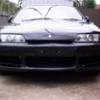Interesting Info About Engine Noise I Found
Announcements
-
Similar Content
-
Latest Posts
-
"lol dunno" either But like you, I can't see any reason they would need to be different LHD to RHD
-
I agree with you WRT the hard top. MX5's may be one of the better looking soft tops but I cannot think of ANY car, EVER that looks better with a soft top vs a hard top (or a designed roof). At all, ever. I also feel this way about the C5 Vette, the Z06 looks horrible compared to it's original form, it has an exaggerated version of the differences you're talking about.
-
By Last Phantom · Posted
Hey crew, Failed my WOF cause of a lower control arm, and I've decided to hit both arms, and also the compression rods at the same time(seems they're gonna be the most likely upcoming failure points from some discussions with the lads over on the G35 reddit). I've looking at these form Z1: https://www.z1motorsports.com/front-suspension/hayaku-automotive/hayaku-g35-front-compression-rod-p-40716.html https://www.z1motorsports.com/front-suspension/hayaku-automotive/hayaku-g35-front-lower-control-arm-p-40674.html I asked Z1 if they'd work as it's the same platform, just RHD vs LHD. I basically got told "Lol dunno". Specifically they aren't aware of any difference but can't guarantee fitment as they haven't done it on a 350GT. So guess I'm asking is if there is any issues with using 2005 G35 coupe suspension parts on a 2005 350GT coupe? Orginally I thought it could be something in the way of the arms that each control arm is designed to be positioned around, but that'd be an engineering nightmare for Nissan needing two different shaped control arms 😅 -
^ This. The mode door actuator is a common failure, as is the actuator and/or the actual valve for the coolant flow control valve. I also don't know how available the mode door actuator is these days. I've been meaning to look into it and get one from wherever is possible, to keep in the shed for the rainy day when mine eventually fails. Anyway, the advice to you is to search the usual NOS part supply places, or even just go to Nissan and see what they list.
-
Have you got a pic of the actuator? My guess is that unit has failed internally and was flopping around, so the previous engineer who owned it forced it to be fully open to cold air (blocking the heater core path). As far as you can tell, is anything else wrong in the system? Likely you just need a new actuator (not sure how available they are) and then "installation is the reverse of disassembly"
-



Recommended Posts
Create an account or sign in to comment
You need to be a member in order to leave a comment
Create an account
Sign up for a new account in our community. It's easy!
Register a new accountSign in
Already have an account? Sign in here.
Sign In Now